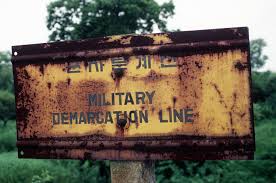demarcation
英 [ˌdiː.mɑːˈkeɪ.ʃən]
美 [ˌdiː.mɑːrˈkeɪ.ʃən]
- n. 划分;划界;限界
星级词汇:

记忆方法
将“demarcation”分解为“de”和“marc”,记住“de”是“去掉”的意思,而“marc”可以想象为“记号”或“界限”。这样,可以形象地记住“demarcation”是指去掉(某些界限)的过程或状态,即界定或划分界限。
以上内容由AI生成, 仅供参考和借鉴
英语词源
- demarcation
-
demarcation: [18] As its form and meaning would suggest, demarcation is indeed related to mark, but only in a distinctly roundabout way. The word comes, possibly via French, from Spanish demarcación, a derivative of the verb demarcar ‘mark out the boundaries of’, which in turn is descended ultimately from the same prehistoric Germanic ancestor as English mark ‘sign, trace’.
It originally came into English in very specific application to the boundary line between the Spanish and Portuguese spheres of influence in the New World, as laid down by Pope Alexander VI in a bull of 4 May 1493. In Spanish this was the linea de demarcación (in Portuguese, linha de demarcação). By the middle of the 18th century the word was being used in English in much more general contexts.
The familiar modern phrase demarcation dispute, relating to inter-union squabbles, dates from the 1930s.
- demarcation (n.)
- c. 1752, from Spanish linea de demarcacion or Portuguese linha de demarcaçao, name of the line laid down by Pope Alexander VI, May 4, 1493, dividing the New World between Spain and Portugal on a line 100 leagues west of the Cape Verde Islands. Applied from 1801 to other lines dividing regions. From Spanish de- (see de-) + marcar "to mark the boundaries of," from a Germanic source (see mark (n.1)).
权威例句
- 1. It was hard to draw clear lines of demarcation between work and leisure.
- 在工作和闲暇之间很难划出明确的界限。
- 2. Talks were continuing about the demarcation of the border between the two countries.
- 关于两国之间边界划定问题的谈判仍在继续。
- 3. There is no sharp demarcation between these two types.
- 在这两种结构之间,没有明显的分界.
- 4. A sharp demarcation of adventive embryos from zygotic embryos cannot be drawn.
- 不定胚与合子胚之间不能划分出明显的界限.
- 5. The demarcation among characters in a string.
- 字符串中各字符间的分界.